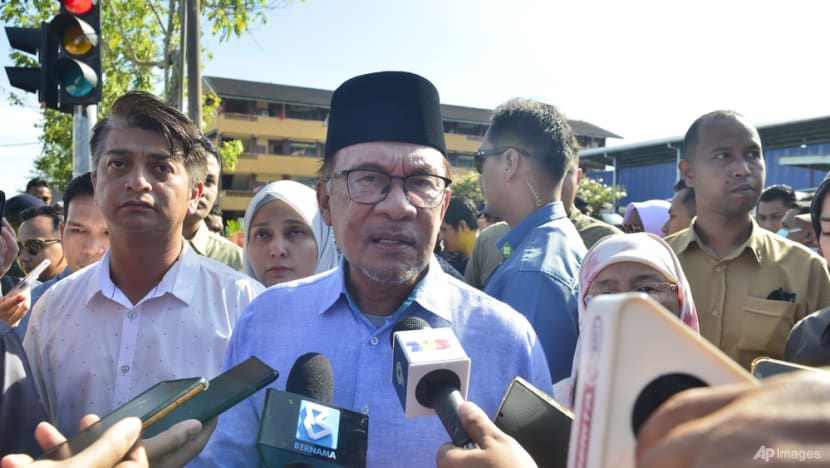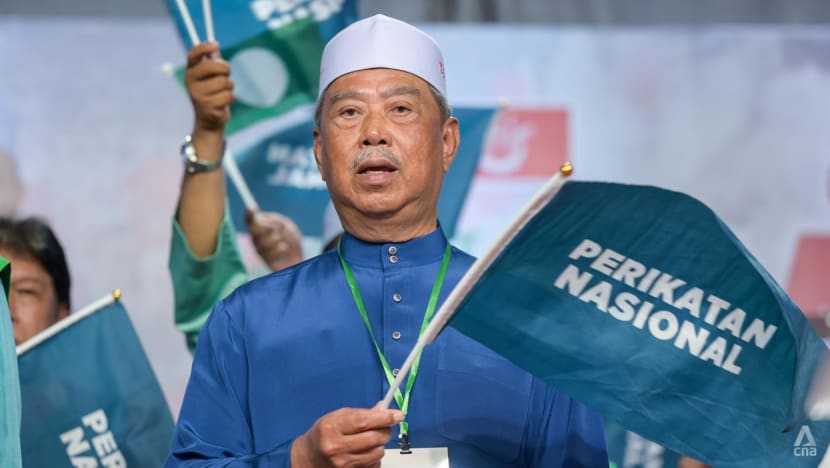Commentary: What next for Malaysia's opposition after split victories in state polls
Malaysia’s Perikatan Nasional opposition coalition did indeed inflict some political damage on Prime Minister Anwar Ibrahim’s government in the state assembly elections last weekend, but the road ahead is set to be bumpy, says CNA's Leslie Lopez.

KUALA LUMPUR: The cage-rattling of an imminent overthrow of Prime Minister Anwar Ibrahim’s unity government that presaged the six state elections last weekend has dissipated, leaving Malaysia’s opposition alliance with a set of uphill challenges until the next main electoral flashpoint of national polls that is four years away.
The opposition Perikatan Nasional (PN), dominated by the right-wing Parti Islam Se-Malaysia (PAS) and Parti Pribumi Bersatu Malaysia (Bersatu), emerged with limited success. The coalition’s strategy to exploit the disenchantment of the politically dominant ethnic Malay community towards Mr Anwar and his multiracial Pakatan Harapan (PH) ruling alliance in the recent polls only worked to an extent, particularly in the rural states.
Now, the PN coalition must figure out how it can broaden its appeal across Malaysia, particularly in the multi-ethnic urban and semi-urban regions, where the rhetoric of race and religion does not resonate as strongly compared to issues over economic opportunities, cost of living pressures and governance.
It is set to be a tall order for a number of reasons, including leadership issues facing the coalition and the absence of a compelling national economic agenda to rival PH.
ECONOMIC DELIVERABLES
The status quo was held in the state assembly elections on Aug 12, with PAS strengthening its control over the rural Kedah, Terengganu and Kelantan, while Mr Anwar’s PH coalition retained control of Penang, Selangor and Negeri Sembilan.
Bersatu, which is headed by former prime minister Muhyiddin Yassin and has long relied on its Islamic political partner’s superior election machinery and support with the conservative segments of the Malay community, emerged a little short-changed.
In the run-up to the state assembly elections, Bersatu trained all its political firepower in Selangor where it had hoped to create an upset by wresting control of the state government. The party presented a narrative that a win in Selangor would trigger a fresh round of coalition talks, similar to the so-called “Sheraton Move” in late February 2020 that saw the collapse of the PH government that had won the general election 22 months earlier.
The party, however, fell well short of those expectations. Without a political beachhead to call its own, Bersatu must now accept its role as a member of Malaysia’s opposition until the next general election, which is only due sometime in mid-2027.
To be sure, PAS and Bersatu did manage to extend their political reach in the three PH-controlled states, largely in pockets where the Malay voting population is dominant.
A majority view among the pundits was that the polls, shaped as an unofficial referendum on Mr Anwar’s nearly nine-month premiership, represented a setback for PH, which is struggling to establish strong credentials with the majority Malay population.
But PH leaders have argued that Mr Anwar’s inclusive brand of politics is slowly finding appeal with the younger urban Malays voters who are uneasy about PAS broadening its appeal outside of the Malays belt states.
How Mr Anwar moves to build his coalition’s appeal among the youth in the PAS-controlled state between now and the next election will present a separate set of challenges for the opposition coalition. Much of it will boil down to which side is able to deliver on the economy.
Apart from Kelantan, Terengganu and Kedah, PAS also controls the state government of Perlis, which borders Thailand.
All four states are among Malaysia’s most economically backward. They struggle annually with serious flooding and suffer from woeful infrastructure, including serious shortcomings in basic amenities, such as the supply of clean water. The conservative party has failed to meld its religious ideals with sound economic management, forcing the younger population to leave to seek economic opportunities in the urban states of Selangor, Penang and even Singapore.
The prospects of PAS delivering on the economic front without financial aid from the Anwar-led federal government is bleak. This in turn, would give the PH coalition the upper hand and in time potentially ameliorate the adverse sentiment toward the multiracial coalition and present a check to the expansion of PAS outside the so-called Malay belt states.

WHAT NOW FOR BERSATU?
Bersatu’s challenges are more existential.
The party is a breakaway from the United Malays National Organisation (UMNO), which had ruled Malaysia for more than six decades before being booted out of power in 2018. It was formed in September 2016 after Mr Muhyiddin and former prime minister Dr Mahathir Mohamad abandoned UMNO following a political fallout with Malaysia’s now-jailed former prime minister and UMNO president, Najib Razak.
Without a powerbase, the party now faces an uphill task to remain politically relevant until the next general election.
The party’s leadership is grappling with legal troubles over charges of corruption that are bound to be a serious distraction to performing as a credible opposition and staying cohesive. Apart from Mr Muhyiddin, opposition leader Hamzah Zainuddin and Azmin Ali, a former senior politician in Mr Anwar’s Parti Keadilan Rakyat (PKR) party, Bersatu does not have a second echelon leadership line-up.
Separately, a new dynamic is taking shape in Malaysian politics.
The last two general elections in Malaysia featured contests between three broad political forces. In the 2018 general election, the fight was between the UMNO-led Barisan Nasional (BN) coalition, PH and PAS, while the polls in November 2022, saw fights between PH, BN and PN.
Last weekend’s state assembly elections featured straight fights between Mr Anwar’s unity government that now includes UMMO and BN against the PN.
To emerge as a serious alternative, the PN coalition must find something other than the disenchantment among the Malay community towards establishing a national political footprint.
Leslie Lopez is a senior correspondent at CNA Digital who reports on political and economic affairs in the region.



















